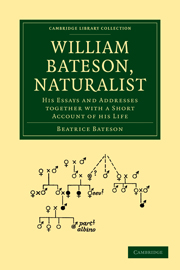Book contents
- Frontmatter
- Contents
- MEMOIR
- Hybridisation and Cross-breeding as a Method of Scientific Investigation
- Problems of Heredity as a subject for Horticultural Investigation
- An Address on Mendelian Heredity and its application to Man. Delivered before the Neurological Society, London, I. ii. 1906
- Gamete and Zygote. A Lay Discourse. The Henry Sidgwick Memorial Lecture, 1917
- Heredity and Variation in Modern Lights
- Presidential Address to the Zoological Section, British Association: Cambridge Meeting, 1904
- Presidential Address to the Agricultural Subsection, British Association: Portsmouth Meeting, 1911
- Presidential Address to the British Association, Australia: (a) Melbourne Meeting, 1914. (b) Sydney Meeting, 1914
- The Methods and Scope of Genetics. Inaugural Lecture delivered 23 October 1908. Cambridge
- Biological Fact and the Structure of Society. The Herbert Spencer Lecture, 28 February 1912. Oxford
- Science and Nationality. Presidential Address delivered at the Inaugural Meeting of the Yorkshire Science Association
- Common-sense in Racial Problems. The Galton Lecture
- Evolutionary Faith and Modern Doubts. Address to American Association for the Advancement of Science. Toronto, 1922
- Progress in Biology. An Address delivered March 12, 1924, on the occasion of the Centenary of Birkbeck College, London
- EDUCATIONAL ESSAYS
- Address to the Salt Schools, Saltaire, Shipley. 7 December 1915
- Evolution and Education
- The Place of Science in Education
- Classical and Modern Education
- Classical Education and Science Men. (Précis of evidence offered to the Prime Minister's Committee on Classics. June 1920)
- REVIEWS
- APPENDIX
- INDEX OF PERSONS
- INDEX OF SUBJECTS
- PLATES I-III (Figs. 1-6) to Mendelian Heredity and its application to Man
The Place of Science in Education
Published online by Cambridge University Press: 07 September 2010
- Frontmatter
- Contents
- MEMOIR
- Hybridisation and Cross-breeding as a Method of Scientific Investigation
- Problems of Heredity as a subject for Horticultural Investigation
- An Address on Mendelian Heredity and its application to Man. Delivered before the Neurological Society, London, I. ii. 1906
- Gamete and Zygote. A Lay Discourse. The Henry Sidgwick Memorial Lecture, 1917
- Heredity and Variation in Modern Lights
- Presidential Address to the Zoological Section, British Association: Cambridge Meeting, 1904
- Presidential Address to the Agricultural Subsection, British Association: Portsmouth Meeting, 1911
- Presidential Address to the British Association, Australia: (a) Melbourne Meeting, 1914. (b) Sydney Meeting, 1914
- The Methods and Scope of Genetics. Inaugural Lecture delivered 23 October 1908. Cambridge
- Biological Fact and the Structure of Society. The Herbert Spencer Lecture, 28 February 1912. Oxford
- Science and Nationality. Presidential Address delivered at the Inaugural Meeting of the Yorkshire Science Association
- Common-sense in Racial Problems. The Galton Lecture
- Evolutionary Faith and Modern Doubts. Address to American Association for the Advancement of Science. Toronto, 1922
- Progress in Biology. An Address delivered March 12, 1924, on the occasion of the Centenary of Birkbeck College, London
- EDUCATIONAL ESSAYS
- Address to the Salt Schools, Saltaire, Shipley. 7 December 1915
- Evolution and Education
- The Place of Science in Education
- Classical and Modern Education
- Classical Education and Science Men. (Précis of evidence offered to the Prime Minister's Committee on Classics. June 1920)
- REVIEWS
- APPENDIX
- INDEX OF PERSONS
- INDEX OF SUBJECTS
- PLATES I-III (Figs. 1-6) to Mendelian Heredity and its application to Man
Summary
That secondary education in England fails to do what it might is scarcely in dispute. The magnitude of the failure will be appreciated by those who know what other countries accomplish at a fraction of the cost. Beyond the admission that something is seriously wrong there is little agreement. We are told that the curriculum is too exclusively classical, that the classes are too large, the teaching too dull, the boys too much away from home, the examination-system too oppressive, athletics overdone. All these things are probably true. Each cause contributes in its degree to the lamentable result. Yet, as it seems to me, we may remove them all without making any great improvement. All the circumstances may be varied, but that intellectual apathy which has become so marked a characteristic of English life, especially of English public and social life, may not improbably continue. Why nations pass into these morbid phases no one can tell. The spirit of the age, that “polarisation of society” as Tarde used to call it, in a definite direction, is brought about by no cause that can be named as yet. It will remain beyond volitional control at least until we get some real insight into social physiology. That the attitude or pose of the average Englishman towards education, knowledge and learning is largely a phenomenon of infectious imitation we know.
- Type
- Chapter
- Information
- William Bateson, NaturalistHis Essays and Addresses Together with a Short Account of His Life, pp. 425 - 440Publisher: Cambridge University PressPrint publication year: 2009First published in: 1928

